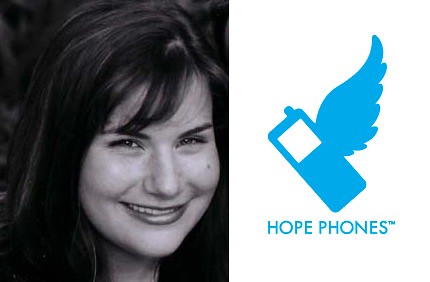
Back in February, we held a tweetup and phone drive at the 10th Annual ePharma Summit in NYC to benefit HopePhones.org. We interviewed Tierney O’Dea about how she became involved with Hope Phones and why our readers should get involved. Tierney O’Dea is the campaign manager for Hope Phones at Medic Mobile.
Would you please tell our readers a little bit about Hope Phones – as in, your story and your mission?
We founded Hope Phones in 2009 as an innovative way to fund the efforts of Medic Mobile, a nonprofit focused on advancing healthcare networks in developing countries using mobile technology. During our pilot program in 2008 – we deployed a donated laptop, 100 recycled cell phones, and a copy of the open source FrontlineSMS software to set up an text-based communication network for St. Gabriels Hospital in Malawi. The network allowed the hospital to more effectively serve a wide rural area of 250,000 people with emergency medical care, patient tracking, HIV and tuberculosis drug adherence, instant drug dosage/usage information, maternal health, and HIV/AIDS support. As of 2011, Medic Mobile’s tools are currently deployed in 11 countries, improving the healthcare of 4.5 million people.
Around the world, there are more than 2.4 billion cell phone users ¢‚Ǩ” and more than 1,000 new customers are added every minute. The U.S. alone discards about 500,000 phones every day. When you recycle a used cell phone through the Hope Phones campaign, our recycling partner assigns a value to that phone that is transferred to our account so we can acquire appropriate technology for the field. Hope Phones helps community health workers connect distant patients to a medical clinic. A $10 cell phone will give 50 families access to emergency medical care, health information, transport services, and clinic resources. The average donated phone in the US will allow us to purchase 2-3 cell phones for the field. Smartphones can yield 5-10.
What kind of need did you observe for an organization like Hope Phones?
Over 125 million cell phones are discarded in the United States as household waste – polluting the environment with tons of plastic and persistent toxins like lead, nickel, beryllium, and cadmium. Cell phone recycling both reduces hazardous waste responsibly while providing a significant public health benefit at home and abroad through Medic Mobile.
Hope Phones is a mission that resonates while simply communicating the goals of mHealth. It works as an awareness campaign with the added benefit of producing a direct, measurable environmental and social impact.
What are some success stories as a result of your efforts that you can share with us?
After just six months 150 patients at the rural hospitals in Malawi had received emergency care, community health workers had saved 1,200 hours of travel time which they used to visit more patients, the number of people being treated for tuberculosis doubled, and the hospital saved $3,500 worth of fuel, that was used instead to purchase medication for patients.
A group of physical therapists in Northern Virginia ran collection drives through their school system and local running club. They collected a few hundred handsets that provided funds to equip health workers at a rehabilitation center in Lilongwe, Malawi and an additional group of health workers St. Gabriel’s Hospital. From major corporations to boy scouts, we have many groups now actively running collection drives around the US to also have this kind of direct impact.
How can our readers get involved, both individually, and as organizations?
We are looking for dedicated individuals who want to start collection drives in their community, organizations, corporate partners with large fleets of phones, and of course, anyone who is interested in making a real impact with those old phones in a drawer at home. The Hope Phones campaign is unique in that it provides a triple benefit. Donors are doing something environmentally sustainable, supporting tangible efforts on the frontlines of global health – and getting a tax deduction. If you go to our website http://www.hopephones.org you can immediately print out pre-paid shipping labels for 1-10 phones, of fill out a form to received collection drive materials shipped to you for free. The materials include promotional posters and shipping boxes that can fit up to 50 phones each with paid return FedEx labels. Anyone can contact us at info@hopephones.org if they have questions or if they would like help with their drive. We take ANY phone – working or not, and don’t need chargers or accessories. Our recycling partner erases all data through a certified and secure process.
You can also help spread the word. We’re on Facebook at http://www.facebook.com/hopephones and twitter @hopephones.
What’s next in the pipeline for Hope Phones?
Right now, we are collecting about 1000 phones per month. We hope to increase that number significantly in 2011-2012 and are already rapidly scaling the effort. If Hope Phones can recycle just 1% of disposed phones each year, we can outfit 1 million health workers, improving the lives of 50 million people.
One Response to Interview with Hope Phones’ Tierney O’Dea